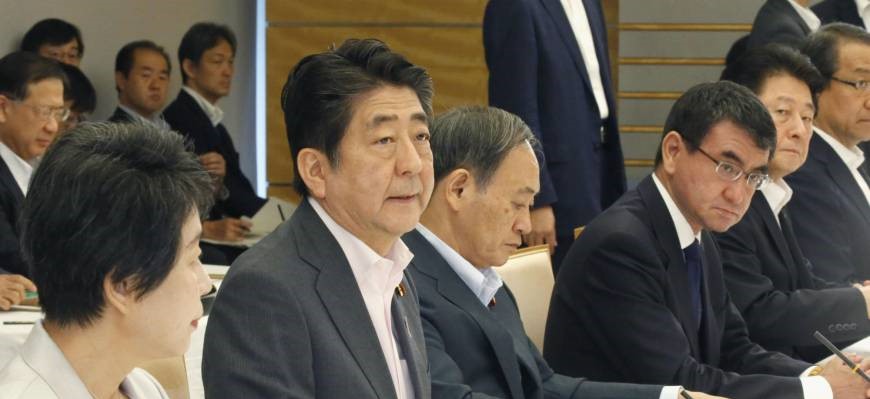Japan Seeks More Immigrants
December 14, 2018 | Expert Insights

Japan’s government has formally passed a legislation to allow more foreign workers to bolster the shrinking labour force. In 2019, immigration rules will be relaxed for foreigners looking to work in Japan.
Background
Japan is one of the most rapidly ageing societies in the world. More than 20% of its population is over 65 years old. Just 946,060 babies were born in 2017, a record low since official records began in 1899, while an increase in deaths accelerated the population decline. High life expectancy levels and falling birth rates are set to drastically reduce Japan's working age population — defined as those under the age of 64. Presently, three out of 10 people are currently aged 65 years and older but that's set to increase to four in 10 over the next four decades, according to the International Monetary Fund.
Japan’s population of 127 million is expected to shrink to 88 million by 2065.

Analysis
Japan's government formally passed legislation to allow more foreign workers in a move aimed at alleviating severe labour shortages that are a major drag on the Japanese economy. The Abe government has settled on a guest-worker plan that will deliver fewer than a quarter of the 1.5 million people to plug the labour shortage over the next five years.
The law will take effect in April 2019 and create two new visa categories. The first status grants residency for five years to foreign trainees who have completed their education or have certain skills and Japanese-language ability. Residents under this category will not be able to bring their families. The second status grants residency to more highly skilled workers for one to three years and can be renewed indefinitely for long-term employment. Visa holders may also bring their families. The world's third-largest economy will allow unskilled foreigners to work in 14 sectors such as construction and elderly care for up to five years. Currently, unskilled workers are only accepted under an intern training program.
Japan has traditionally been wary of immigration but the government says more foreigners are needed because of Japan's ageing population. In total, Tokyo plans to accept around 340,000 foreigners into the country. “But that won't be enough to counter Japan's declining population, which dropped by 373,000 in 2017,” said Kohei Iwahara, the economist at Natixis Japan Securities.
"Although the policy to open the door is on the right direction, the government needs to accept more."
"The changes to the immigration legislation means that the inflow of foreign workers over the next couple of years will probably exceed the 195,000 in 2017," said Marcel Thieliant, Senior Japan, Australia & New Zealand Economist at Capital Economics. "That will offset some of the roughly 500,000 annual declines in the working-age population over the coming decade, but it probably won't be enough to prevent the working-age population from shrinking altogether."
While Abe's administration also plans to use automation technology and artificial intelligence to deal with the labour crunch, it has realized that it can no longer ignore the option of more migrant workers. But many, including opposition politicians, are wary of the impact more foreign labour will have on Japan's homogeneous society.“There are concerns that the crime rate may rise, and jobs may be taken (from Japanese workers),” said Tomomi Inada, a member of Abe’s Liberal Democratic Party, during the debate.
For unskilled foreigners, especially those from developing countries, the problem of human rights violations is another obstacle. The government has long faced criticism over the treatment of such workers, who work as "technical interns," amid numerous reports of sub-par working conditions, salaries that are below minimum wage and long hours. With more unskilled workers set to arrive next year, more of such cases could occur, said Iwahara. The government has promised to deal with the issues, but no concrete measures have yet been announced, according to Shirai.
As the country looks to bring in more foreign workers to address a severe labour shortage, the Immigration Bureau will next year become an agency under the Justice Ministry. The ministry also aims to conclude bilateral agreements with seven countries by March to share information related to criminal investigations, in an effort to shut out rogue labour brokers and protect workers’ human rights
Despite its reputation as a closed country, in 2016 Japan ranked fourth among OECD countries on the inflow of foreign residents, behind only Germany, the United States and Britain.
Assessment
Our assessment is that Japan’s solution to reversing the demographic situation can have varied outcomes. We believe that the domestic anxieties towards immigration could lead to disruption due to which foreigners will have to face discrimination. We feel that Japan is still not an inclusive society and therefore accepting diversity will be difficult. At the same time, large influx of foreign workers will likely outnumber the Japanese increasing social and cultural issues.








Comments